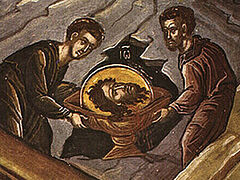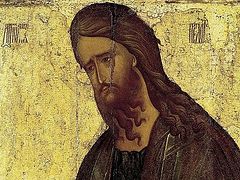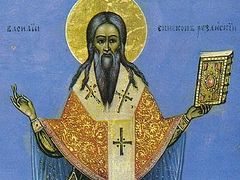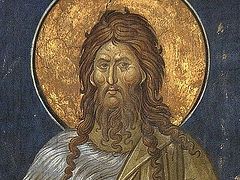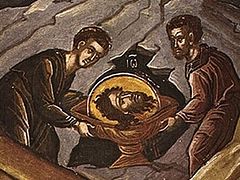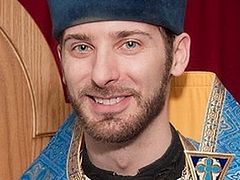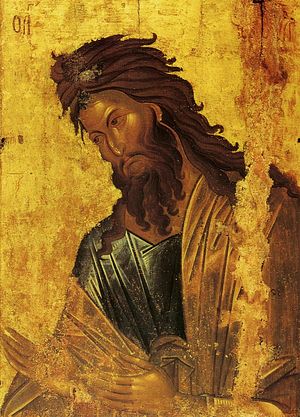 The holy Prophet, Forerunner, and Baptist of the Lord, John.
The holy Prophet, Forerunner, and Baptist of the Lord, John.
An unexpected mention of St. John the Baptist can be found in the Akathist to Holy Equal-to-the-Apostles Nicholas of Japan. Especially since the likeness of these two great ascetics underlined by the composer of this prayer truly is extraordinary. “For thou didst not work miracles, just as St. John the Baptist,” it says of the Enlightener of Japan, “beyond the testimony of your newly-founded Church”.
We don’t often think about this, but the Forerunner of Christ, about whom the Savior said, Among them that are born of women there hath not risen a greater than John the Baptist (Matt. 11:11), in fact never worked miracles. He spoke of the imminent Kingdom of Heaven, about the need to repent (Mt. 3:2), and he spoke zealously and directly. He fearlessly rebuked religious and political leaders, and called the people to abandon their errors. And nevertheless, his preaching remained but a “voice crying in the wilderness”, words without obvious miracles.
It is worth noting yet another New Testament testimony to the Forerunner’s prophetic service. When one day the chief priests and the scribes came upon him [Christ] with the elders, in order to try once again to catch Him up in His words, in answer to the question, by what authority does the Lord preach, the Savior pointed to the authority of John the Baptist: I will also ask you one thing; and answer me: The baptism of John, was it from heaven, or of men? (Lk. 20:1–4). To everyone’s amazement, the Savior’s unexpected question really put those men who dared to tempt God in a difficult position, stopping the mouths of the people’s elders: If we shall say, From heaven; he will say, Why then believed ye him not? But and if we say, Of men; all the people will stone us: for they be persuaded that John was a prophet. And they answered, that they could not tell whence it was (Lk. 20:5–7).
This incident is worth our attention. After all, those men who craftily hounded the Savior were silenced by the Righteous One, who had never worked a single miracle before the people. John the Baptist’s only weapon against the slanderers and enemies of the Gospel was his faithfulness to God. Even Herod, whom the Forerunner exposed and who had to endure much because of him, couldn’t even resolve to put him to death. To the contrary, he feared John, knowing that he was a just man and an holy, and observed him; and when he heard him, he did many things, and heard him gladly (Mk. 6:20).
The prophet Jeremiah spoke of the New Testament God with people: But this shall be the covenant that I will make with the house of Israel; After those days, saith the Lord, I will put my law in their inward parts, and write it in their hearts; and will be their God, and they shall be my people. And they shall teach no more every man his neighbour, and every man his brother, saying, Know the Lord: for they shall all know me, from the least of them unto the greatest of them, saith the Lord: for I will forgive their iniquity, and I will remember their sin no more (Jer. 31:33–34). The life of St. John the Baptist was the very fulfillment of those words, because the nearness of God became so clearly witnessed that no miracles were even needed to confirm it. In fact, the life of St. John the Baptist was the very miracle that many expected from a righteous man.
In this sense, the problem often arises before Christians of how to prove the truth of their convictions, to instruct apostates, or help the doubting. The example of St. John the Baptist’s life speaks clearly about how every Christian has it within his power to work the miracle that people so need. And this miracle is one’s own faithful life. The Lord gave us what is sufficient to convince. He gave us the possibility to become saints. Nothing else is needed. Therefore the apostle Paul calls us to be “epistles of Christ” (2 Cor. 3:2–3), in which the Gospel will be written “in the spirit and power of Elias”. Blessed Augustine similarly clearly speaks of the missionary potential of the life of every Christian: “Never speak of Christ until you are asked, but live in such a way that you will be asked about Him.”

